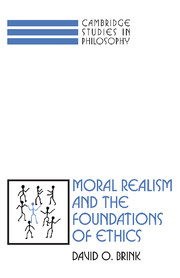Book contents
- Frontmatter
- Contents
- Preface
- 1 INTRODUCTION
- 2 MORAL REALISM AND MORAL INQUIRY
- 3 EXTERNALIST MORAL REALISM
- 4 DOES MORAL REALISM MATTER?
- 5 A COHERENTIST MORAL EPISTEMOLOGY
- 6 MORAL REALISM AND THE IS/OUGHT THESIS
- 7 A POSTERIORI OBJECTIONS TO MORAL REALISM
- 8 OBJECTIVE UTILITARIANISM
- Appendix 1 Must an infinite regress of justification be vicious?
- Appendix 2 Coherence, internalism, and externalism in epistemology
- Appendix 3 The is/ought thesis and intuitionism
- Appendix 4 Rawlsian constructivism
- Bibliography
- Index
8 - OBJECTIVE UTILITARIANISM
Published online by Cambridge University Press: 11 January 2010
- Frontmatter
- Contents
- Preface
- 1 INTRODUCTION
- 2 MORAL REALISM AND MORAL INQUIRY
- 3 EXTERNALIST MORAL REALISM
- 4 DOES MORAL REALISM MATTER?
- 5 A COHERENTIST MORAL EPISTEMOLOGY
- 6 MORAL REALISM AND THE IS/OUGHT THESIS
- 7 A POSTERIORI OBJECTIONS TO MORAL REALISM
- 8 OBJECTIVE UTILITARIANISM
- Appendix 1 Must an infinite regress of justification be vicious?
- Appendix 2 Coherence, internalism, and externalism in epistemology
- Appendix 3 The is/ought thesis and intuitionism
- Appendix 4 Rawlsian constructivism
- Bibliography
- Index
Summary
My defense of moral realism is now near completion. We have seen reasons to want to defend moral realism. Various features of moral inquiry presuppose or are naturally explained by a realist form of cognitivism (2.5–2.8); the practical or action-guiding character of morality supports moral realism (Chapter 3); and moral realism's practical implications seem superior to those of many antirealist theories (Chapter 4). These considerations create a presumption in favor of moral realism and place the burden of proof on the antirealist.
Antirealist rebuttals typically depend on mistaken assumptions about the metaphysical and epistemological commitments of moral realism; it is often assumed that the moral realist's metaphysical and epistemological commitments are quite different from those of recognizably realist disciplines such as the natural or social sciences. These assumptions are mistaken either about the commitments of moral realism or about those of other, recognizably realist disciplines. Those genuine metaphysical and epistemological commitments of moral realism are, indeed, parallel to the genuine metaphysical and epistemological commitments of other realist disciplines.
An intuitionist moral epistemology is no less and no more plausible than foundationalism is in general (5.3); neither moral nor nonmoral beliefs can be self-evident (5.5). Moral realism, like other kinds of realism, can and should be combined with a coherence theory of justification (5.6–5.9). A moral belief's coherence with, among other things, considered moral beliefs will be evidence of its objective truth. Neither moral realism nor a coherence theory of justification in ethics is undermined by the existence of an is/ought gap.
- Type
- Chapter
- Information
- Moral Realism and the Foundations of Ethics , pp. 211 - 290Publisher: Cambridge University PressPrint publication year: 1989
- 2
- Cited by



